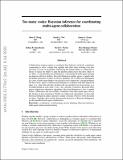| dc.contributor.author | Wu, Sarah A | |
| dc.contributor.author | Wang, Rose E | |
| dc.contributor.author | Evans, James A | |
| dc.contributor.author | Tenenbaum, Joshua B | |
| dc.contributor.author | Parkes, David C | |
| dc.contributor.author | Kleiman-Weiner, Max | |
| dc.date.accessioned | 2021-12-08T15:38:12Z | |
| dc.date.available | 2021-12-08T15:38:12Z | |
| dc.date.issued | 2021 | |
| dc.identifier.uri | https://hdl.handle.net/1721.1/138376 | |
| dc.description.abstract | Collaboration requires agents to coordinate their behavior on the fly, sometimes cooperating to solve a single task together and other times dividing it up into sub-tasks to work on in parallel. Underlying the human ability to collaborate is theory-of-mind (ToM), the ability to infer the hidden mental states that drive others to act. Here, we develop Bayesian Delegation, a decentralized multi-agent learning mechanism with these abilities. Bayesian Delegation enables agents to rapidly infer the hidden intentions of others by inverse planning. We test Bayesian Delegation in a suite of multi-agent Markov decision processes inspired by cooking problems. On these tasks, agents with Bayesian Delegation coordinate both their high-level plans (e.g., what sub-task they should work on) and their low-level actions (e.g., avoiding getting in each other's way). When matched with partners that act using the same algorithm, Bayesian Delegation outperforms alternatives. Bayesian Delegation is also a capable ad hoc collaborator and successfully coordinates with other agent types even in the absence of prior experience. Finally, in a behavioral experiment, we show that Bayesian Delegation makes inferences similar to human observers about the intent of others. Together, these results argue for the centrality of ToM for successful decentralized multi-agent collaboration. | en_US |
| dc.language.iso | en | |
| dc.publisher | Wiley | en_US |
| dc.relation.isversionof | 10.1111/TOPS.12525 | en_US |
| dc.rights | Creative Commons Attribution-Noncommercial-Share Alike | en_US |
| dc.rights.uri | http://creativecommons.org/licenses/by-nc-sa/4.0/ | en_US |
| dc.source | arXiv | en_US |
| dc.title | Too Many Cooks: Bayesian Inference for Coordinating Multi‐Agent Collaboration | en_US |
| dc.type | Article | en_US |
| dc.identifier.citation | Wu, Sarah A, Wang, Rose E, Evans, James A, Tenenbaum, Joshua B, Parkes, David C et al. 2021. "Too Many Cooks: Bayesian Inference for Coordinating Multi‐Agent Collaboration." Topics in Cognitive Science, 13 (2). | |
| dc.contributor.department | Massachusetts Institute of Technology. Computer Science and Artificial Intelligence Laboratory | |
| dc.contributor.department | Massachusetts Institute of Technology. Department of Brain and Cognitive Sciences | |
| dc.contributor.department | Center for Brains, Minds, and Machines | |
| dc.relation.journal | Topics in Cognitive Science | en_US |
| dc.eprint.version | Original manuscript | en_US |
| dc.type.uri | http://purl.org/eprint/type/JournalArticle | en_US |
| eprint.status | http://purl.org/eprint/status/NonPeerReviewed | en_US |
| dc.date.updated | 2021-12-08T15:35:13Z | |
| dspace.orderedauthors | Wu, SA; Wang, RE; Evans, JA; Tenenbaum, JB; Parkes, DC; Kleiman-Weiner, M | en_US |
| dspace.date.submission | 2021-12-08T15:35:15Z | |
| mit.journal.volume | 13 | en_US |
| mit.journal.issue | 2 | en_US |
| mit.license | OPEN_ACCESS_POLICY | |
| mit.metadata.status | Authority Work and Publication Information Needed | en_US |
